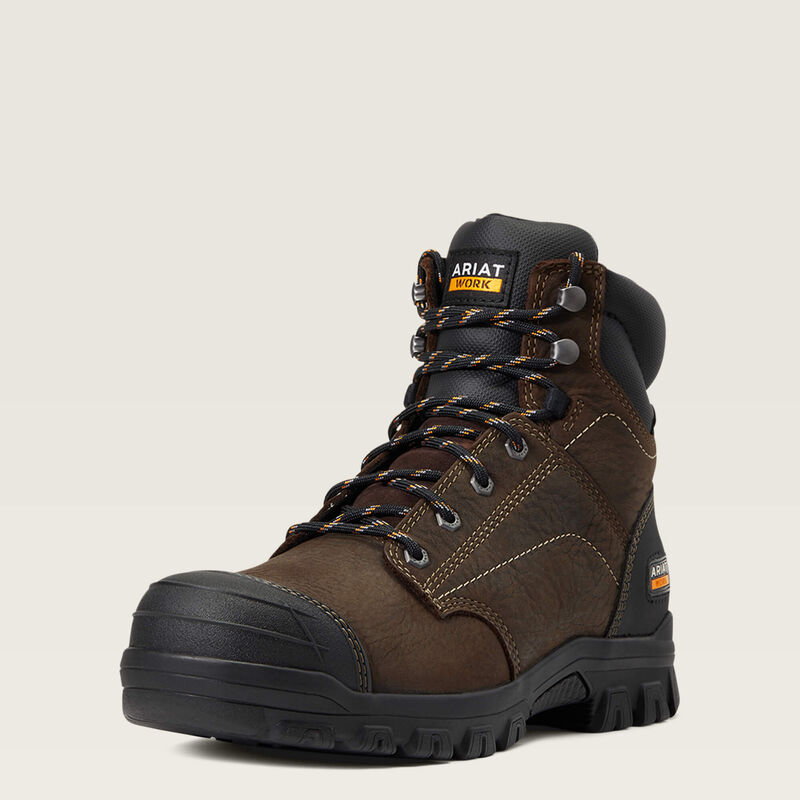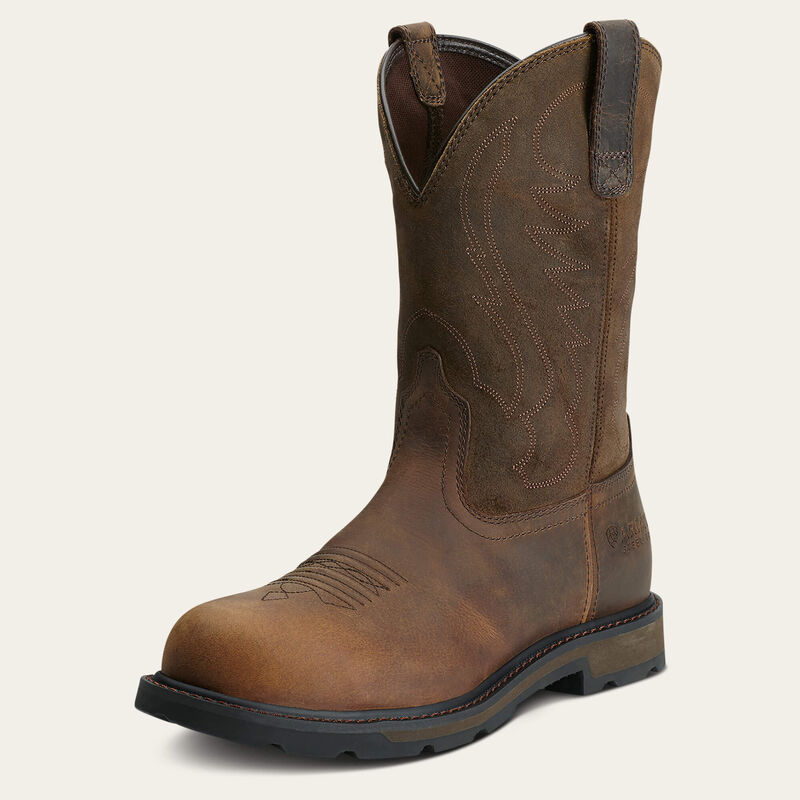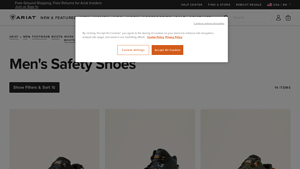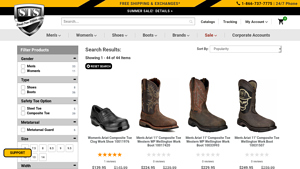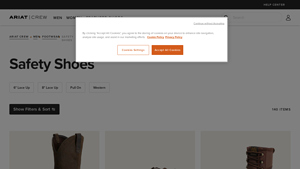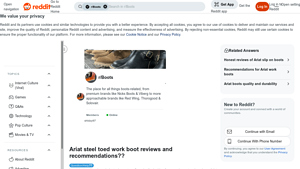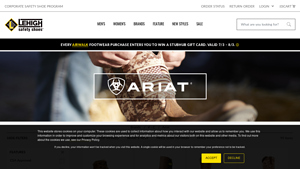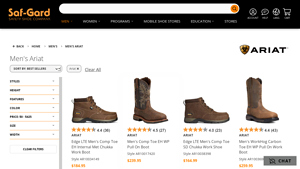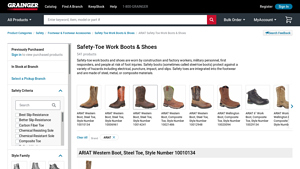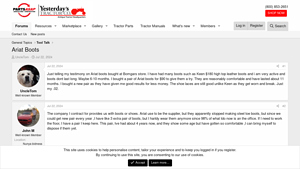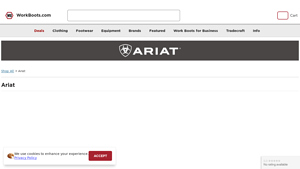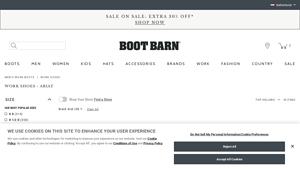Ariat Steel Toe Shoes Guide: Type,Cost,Material…
Introduction: Navigating the Global Market for ariat steel toe shoes
Navigating the complexities of sourcing Ariat steel toe shoes can be a daunting task for international B2B buyers, especially in regions like Africa, South America, the Middle East, and Europe. With diverse work environments that demand varying levels of safety, comfort, and style, the challenge lies in selecting the right footwear that not only meets safety standards but also enhances employee satisfaction and productivity. This comprehensive guide addresses these challenges by exploring a wide range of Ariat steel toe shoe options, including their features, applications, and benefits across different industries.
Buyers will find valuable insights into the specific types of steel toe shoes available, from heavy-duty boots suitable for construction sites to lighter, more versatile options for retail and healthcare settings. Additionally, the guide delves into crucial aspects of supplier vetting, helping businesses identify reliable manufacturers and distributors who can meet their needs. Cost considerations and potential ROI from investing in high-quality safety footwear will also be thoroughly examined, empowering buyers to make informed purchasing decisions.
By leveraging this guide, B2B buyers can confidently navigate the global market for Ariat steel toe shoes, ensuring they select the right products that align with their operational requirements while promoting workplace safety and comfort.
Understanding ariat steel toe shoes Types and Variations
| Type Name | Key Distinguishing Features | Primary B2B Applications | Brief Pros & Cons for Buyers |
|---|---|---|---|
| Steel Toe Work Boots | Heavy-duty steel toe protection, robust construction | Construction, manufacturing, heavy industry | Pros: Excellent protection; Cons: Heavier weight may reduce comfort over long periods. |
| Composite Toe Work Boots | Lightweight, non-metallic materials like carbon fiber | Warehousing, logistics, electrical environments | Pros: Lightweight; Cons: May offer less protection than steel toe in extreme conditions. |
| Waterproof Safety Boots | Waterproof materials, sealed seams | Outdoor work, agriculture, wet environments | Pros: Keeps feet dry; Cons: Can be less breathable, leading to discomfort in hot climates. |
| Slip-Resistant Safety Shoes | Specialized outsole for enhanced grip | Food service, healthcare, retail | Pros: Reduces slip and fall risks; Cons: May wear down faster than other types. |
| Metguard Safety Boots | Additional metatarsal protection | Heavy machinery, construction, warehouse | Pros: Extra protection for the upper foot; Cons: Can be bulkier and restrict movement. |
What are the key characteristics of Steel Toe Work Boots?
Steel toe work boots are designed for maximum protection in hazardous work environments. They feature a reinforced steel toe cap that shields the foot from heavy falling objects and impacts. These boots are typically constructed from durable materials to withstand the rigors of construction, manufacturing, and other heavy industries. Buyers should consider the weight and comfort level, as steel toe boots can be heavier than other options, potentially affecting comfort during long work shifts.
How do Composite Toe Work Boots differ from traditional options?
Composite toe work boots utilize non-metallic materials like carbon fiber, plastic, or fiberglass for toe protection. This makes them significantly lighter than their steel counterparts, which can enhance comfort and reduce fatigue during extended wear. They are ideal for environments where metal detectors are present or where electrical hazards are a concern. B2B buyers should assess the specific safety requirements of their industry, as composite toe boots may not provide the same level of protection as steel toe boots in extreme situations.
Why choose Waterproof Safety Boots for certain applications?
Waterproof safety boots are specifically designed to keep feet dry in wet conditions, making them ideal for outdoor work, agriculture, and jobs that require frequent exposure to moisture. These boots often feature sealed seams and waterproof materials that prevent water ingress. However, buyers should be mindful of the breathability of these boots, as they can become uncomfortable in hot climates. When purchasing, consider the balance between waterproofing and ventilation to ensure all-day comfort.
What advantages do Slip-Resistant Safety Shoes offer?
Slip-resistant safety shoes are equipped with specialized outsoles that provide superior traction on various surfaces, making them essential in environments like food service, healthcare, and retail where slip and fall risks are prevalent. These shoes help prevent workplace accidents, enhancing overall safety. However, businesses should consider the longevity of the slip-resistant feature, as it may wear down faster than traditional soles, necessitating more frequent replacements.
When are Metguard Safety Boots necessary in the workplace?
Metguard safety boots offer an additional layer of protection for the metatarsal area of the foot, making them suitable for jobs involving heavy machinery, construction, or warehouse work where the risk of foot injuries is heightened. The added protection can be beneficial for workers in environments where heavy objects are frequently handled. Buyers should evaluate the trade-off between added protection and potential bulkiness, as these boots may restrict movement compared to standard safety footwear.
Key Industrial Applications of ariat steel toe shoes
| Industry/Sector | Specific Application of Ariat Steel Toe Shoes | Value/Benefit for the Business | Key Sourcing Considerations for this Application |
|---|---|---|---|
| Construction | Heavy-duty work on construction sites | Protects workers from falling objects and heavy machinery | Durability, compliance with local safety regulations, comfort for long hours |
| Manufacturing | Assembly line and factory work | Reduces foot injuries, enhancing overall productivity | Slip resistance, ease of cleaning, availability of various sizes and widths |
| Warehousing & Logistics | Order picking and material handling | Increases safety and efficiency in high-traffic areas | Lightweight options, waterproof features for varied environments, ergonomic design |
| Oil & Gas | Fieldwork in harsh environments | Provides protection against heavy equipment and hazardous conditions | Compliance with industry standards, insulation for temperature variations, chemical resistance |
| Agriculture | Farm work and machinery operation | Ensures safety while working with heavy equipment and livestock | Waterproof options, ease of maintenance, traction for varied terrains |
How are Ariat Steel Toe Shoes Used in the Construction Industry?
In the construction sector, Ariat steel toe shoes are essential for workers who face risks from heavy materials and equipment. These shoes protect against injuries caused by falling objects, ensuring compliance with safety regulations. For international buyers, sourcing durable footwear that meets local standards is crucial, especially in regions with strict safety codes, such as Europe and the Middle East.
What Role Do Ariat Steel Toe Shoes Play in Manufacturing?
Manufacturing environments often involve repetitive tasks and assembly lines where foot injuries can significantly impact productivity. Ariat steel toe shoes provide the necessary protection while offering comfort for long shifts. Buyers in Africa and South America should prioritize slip-resistant and easy-to-clean features, ensuring their workforce remains safe and efficient.
How Do Ariat Steel Toe Shoes Enhance Safety in Warehousing & Logistics?
In warehousing and logistics, workers navigate busy environments, making safety a top priority. Ariat steel toe shoes are designed to protect against foot injuries while enhancing mobility during tasks like order picking and material handling. When sourcing for these applications, businesses should consider lightweight and waterproof options to adapt to varying conditions, particularly in humid regions.
Why Are Ariat Steel Toe Shoes Essential in the Oil & Gas Industry?
Fieldwork in the oil and gas sector presents unique hazards, including exposure to heavy machinery and extreme conditions. Ariat steel toe shoes offer robust protection, ensuring safety in these demanding environments. Buyers need to focus on sourcing shoes that comply with industry standards, providing insulation and chemical resistance to withstand harsh conditions prevalent in regions like the Middle East.
How Do Ariat Steel Toe Shoes Support Agricultural Workers?
In agriculture, workers often handle heavy machinery and livestock, making protective footwear vital. Ariat steel toe shoes help prevent injuries while ensuring comfort during long hours in the field. International buyers should look for waterproof and easy-to-maintain options, as agricultural work can vary significantly across climates, particularly in Africa and South America.
3 Common User Pain Points for ‘ariat steel toe shoes’ & Their Solutions
Scenario 1: Sizing and Fit Issues in Bulk Orders
The Problem: When purchasing Ariat steel toe shoes for a large workforce, B2B buyers often encounter challenges related to sizing and fit. Different employees may have varying foot sizes, widths, and preferences for styles, making it difficult to standardize orders. This can lead to dissatisfaction among workers who receive ill-fitting shoes, resulting in decreased productivity and increased return costs for the buyer.
The Solution: To mitigate sizing issues, buyers should conduct a thorough foot measurement survey among employees prior to placing an order. Provide a sizing chart and encourage employees to measure their feet accurately, considering both length and width. Additionally, consider ordering a range of sizes and widths to accommodate diverse foot shapes. When placing an order, leverage Ariat’s customer service to discuss bulk purchasing options and potential for returns or exchanges. This proactive approach ensures that employees receive properly fitting shoes, leading to improved comfort and workplace morale.
Scenario 2: Understanding Safety Standards and Compliance
The Problem: B2B buyers often struggle to navigate the various safety standards and certifications required for steel toe shoes, particularly in industries with stringent regulations. In regions like Europe and the Middle East, compliance with specific safety standards (e.g., EN ISO 20345) is critical. Failure to procure compliant footwear can lead to legal liabilities, increased insurance costs, and compromised worker safety.
The Solution: Buyers should familiarize themselves with the relevant safety standards applicable to their industry and region. When selecting Ariat steel toe shoes, ensure they meet the required certifications, such as slip resistance, puncture resistance, and electrical hazard protection. It is advisable to consult Ariat’s product specifications and certifications before making a purchase. Engaging with industry safety experts can also provide insights into the best practices for footwear compliance. By ensuring that the selected footwear adheres to safety regulations, buyers can protect their workforce and minimize legal risks.
Scenario 3: Balancing Comfort and Durability in Extreme Conditions
The Problem: In many industrial sectors, workers are exposed to harsh conditions that demand footwear that can withstand wear while also providing comfort. B2B buyers often face the dilemma of selecting steel toe shoes that are durable enough for rugged environments yet comfortable enough for long hours of wear. Failing to strike this balance can lead to foot fatigue, decreased productivity, and higher turnover rates among workers.
The Solution: To address this issue, buyers should prioritize Ariat models that incorporate advanced comfort technologies, such as cushioned insoles, moisture-wicking materials, and breathable designs. Conducting a pilot test by providing a small group of employees with different styles can help determine which models best meet their comfort needs in the specific working conditions. Additionally, engaging with Ariat representatives to discuss the latest technologies in their steel toe shoes can yield recommendations tailored to the unique challenges faced by the workforce. By investing in footwear that balances durability with comfort, buyers can enhance employee satisfaction and productivity, ultimately benefiting the organization as a whole.
Strategic Material Selection Guide for ariat steel toe shoes
What Are the Key Materials Used in Ariat Steel Toe Shoes?
When selecting steel toe shoes for industrial applications, the choice of materials is crucial for ensuring safety, comfort, and performance. Ariat employs several materials in their steel toe shoes, each with unique properties and applications. Below, we analyze four common materials used in these shoes: steel, composite, aluminum, and rubber.
How Does Steel Contribute to Safety in Steel Toe Shoes?
Steel is the traditional material for safety toe caps, known for its robust protective qualities. It typically offers a high temperature and pressure rating, making it suitable for environments with heavy machinery.
Pros: Steel is highly durable and provides excellent protection against crushing and impact. It is also relatively cost-effective, making it a popular choice for many businesses.
Cons: However, steel can be heavy, which might lead to fatigue during long work shifts. Additionally, it is less suitable for environments where electrical hazards are a concern, as it conducts electricity.
Impact on Application: In industrial settings where heavy objects are frequently moved, steel toe shoes are indispensable. However, buyers in regions with high humidity or extreme temperatures may need to consider comfort and weight factors.
What Advantages Do Composite Materials Offer in Steel Toe Shoes?
Composite materials, such as carbon fiber and plastic, are increasingly popular alternatives to steel. They provide a lightweight option while still meeting safety standards.
Pros: Composite toes are non-metallic, making them ideal for environments with metal detectors or where electrical hazards exist. They are also lighter than steel, reducing fatigue for the wearer.
Cons: On the downside, composite materials may not provide the same level of impact resistance as steel. They can also be more expensive to manufacture, which may translate to higher retail prices.
Impact on Application: Composite toe shoes are particularly well-suited for the healthcare and service industries, where comfort and safety are both paramount. B2B buyers should ensure that these shoes meet local safety standards, such as ASTM or EN ISO.
How Does Aluminum Compare as a Material for Steel Toe Shoes?
Aluminum is another alternative for toe caps, offering a balance between weight and protection.
Pros: Aluminum is lighter than steel but still provides adequate protection against impacts. It also offers a lower profile, which can enhance comfort.
Cons: However, aluminum may not be as durable as steel and can be prone to denting under extreme conditions. Additionally, it does not provide the same level of thermal insulation.
Impact on Application: Aluminum toe shoes are suitable for environments where weight is a significant concern, such as in logistics or warehousing. Buyers from regions with strict safety regulations must verify compliance with standards like CSA or ANSI.
What Role Does Rubber Play in the Comfort and Safety of Steel Toe Shoes?
Rubber is commonly used in the outsoles of steel toe shoes, providing essential traction and slip resistance.
Pros: Rubber outsoles are highly durable and resistant to wear, making them ideal for various surfaces. They also offer excellent grip, reducing the risk of slips and falls.
Cons: The main limitation of rubber is its susceptibility to degradation from certain chemicals and extreme temperatures. This can affect the longevity of the shoes in specific work environments.
Impact on Application: In construction and outdoor settings, rubber-soled shoes can provide the necessary grip and durability. B2B buyers should consider the specific conditions their workforce will encounter, ensuring the rubber used is suitable for the local environment.
Summary of Material Selection for Ariat Steel Toe Shoes
| Material | Typical Use Case for Ariat Steel Toe Shoes | Key Advantage | Key Disadvantage/Limitation | Relative Cost (Low/Med/High) |
|---|---|---|---|---|
| Steel | Heavy industrial environments requiring maximum protection | High durability and impact resistance | Heavy and conducts electricity | Medium |
| Composite | Healthcare and service industries with metal detection | Lightweight and non-conductive | May offer less impact resistance | High |
| Aluminum | Logistics and warehousing where weight matters | Lighter than steel, comfortable | Less durable and thermal insulation | Medium |
| Rubber | Construction and outdoor settings needing traction | Excellent grip and wear resistance | Susceptible to chemical degradation | Low |
This strategic material selection guide provides valuable insights for international B2B buyers looking to invest in Ariat steel toe shoes. By understanding the properties, advantages, and limitations of each material, buyers can make informed decisions that align with their specific operational needs and safety standards.
In-depth Look: Manufacturing Processes and Quality Assurance for ariat steel toe shoes
What Are the Key Stages in the Manufacturing Process of Ariat Steel Toe Shoes?
The manufacturing process of Ariat steel toe shoes involves several meticulously planned stages to ensure quality, durability, and safety. These stages include material preparation, forming, assembly, and finishing.
-
Material Preparation:
The first step involves sourcing high-quality materials, including leather, synthetic fabrics, rubber, and the steel or composite materials used for the toe caps. Ariat emphasizes the importance of durable and lightweight materials, ensuring that the shoes can withstand harsh work environments while providing comfort. The materials undergo rigorous inspection to guarantee they meet the specified standards before moving on to the next phase. -
Forming:
In this stage, the prepared materials are cut and shaped into various components of the shoe. Advanced machinery is often utilized to ensure precision in cutting and molding. For steel toe shoes, the toe caps are formed separately and integrated into the shoe structure. This phase may also include techniques such as molding and stitching, where high-strength threads are used to enhance the shoe’s durability. -
Assembly:
Once the components are formed, they are assembled using a combination of manual labor and automated processes. Skilled workers ensure that each shoe is assembled correctly, focusing on the alignment and fit of all parts. Quality control checkpoints are integrated into this stage, allowing for immediate corrections if any issues are detected. -
Finishing:
The final stage involves adding the finishing touches to the shoes, such as polishing, branding, and applying any additional protective treatments like waterproofing. The shoes undergo a final quality inspection to ensure they meet Ariat’s strict standards before being packaged for distribution.
How Is Quality Assurance Implemented in the Production of Ariat Steel Toe Shoes?
Quality assurance is critical in the production of Ariat steel toe shoes, ensuring that every pair meets both international standards and customer expectations.
-
International Standards Compliance:
Ariat adheres to various international quality standards, such as ISO 9001, which focuses on quality management systems. Compliance with these standards ensures that the manufacturing processes are consistently monitored and improved. Additionally, industry-specific certifications such as CE (Conformité Européenne) for safety footwear are also pursued, indicating compliance with EU regulations. -
Quality Control Checkpoints:
Quality control (QC) is integrated throughout the manufacturing process at several key checkpoints:
– Incoming Quality Control (IQC): This occurs at the material preparation stage, where all materials are inspected for quality before being used in production.
– In-Process Quality Control (IPQC): This takes place during the assembly phase, where ongoing checks ensure that the assembly process meets specified standards.
– Final Quality Control (FQC): This is the last step before packaging, where each shoe is thoroughly inspected for defects, comfort, and performance standards. -
Common Testing Methods:
To ensure the safety and durability of the shoes, Ariat employs various testing methods. These may include:
– Impact and compression testing for the toe caps.
– Slip resistance testing to ensure traction.
– Water resistance tests for waterproof models.
– Electrical hazard testing for shoes designed for such environments.
How Can B2B Buyers Verify the Quality Assurance of Their Suppliers?
For B2B buyers, particularly those in Africa, South America, the Middle East, and Europe, verifying the quality assurance processes of suppliers is crucial for maintaining high standards in their own operations.
-
Supplier Audits:
Conducting regular audits of suppliers can provide insights into their manufacturing processes and quality control measures. This can include on-site visits to observe the production environment, review quality control documentation, and assess compliance with relevant standards. -
Quality Assurance Reports:
Requesting detailed quality assurance reports from suppliers can help buyers understand the specific measures in place. These reports should outline compliance with international and industry-specific standards, as well as any certifications held by the manufacturer. -
Third-Party Inspections:
Engaging third-party inspection services can provide an unbiased assessment of the supplier’s quality control processes. These organizations often conduct thorough evaluations of manufacturing facilities and can provide valuable insights into product quality.
What Are the QC and Certification Nuances for International B2B Buyers?
When dealing with international suppliers, B2B buyers should be aware of various nuances related to quality control and certification.
-
Regulatory Compliance:
Different regions may have varying safety and quality regulations. Buyers should ensure that their suppliers comply with both local and international standards, which may differ in terms of required certifications (e.g., CE in Europe, ANSI in the U.S.). -
Cultural and Operational Differences:
Understanding cultural differences in manufacturing practices is essential. For instance, suppliers in regions such as Africa or South America may have different operational practices compared to those in Europe or the Middle East. Buyers should consider these differences when evaluating suppliers. -
Communication and Documentation:
Clear communication regarding quality expectations is vital. Buyers should ensure that all quality requirements are documented and that suppliers are capable of understanding and meeting these expectations. This can involve providing detailed specifications and quality benchmarks.
Conclusion
In summary, the manufacturing processes and quality assurance systems in place for Ariat steel toe shoes are designed to ensure that the final products meet rigorous safety and quality standards. By understanding these processes, B2B buyers can make informed decisions when selecting suppliers and ensure that the products they procure are reliable and compliant with their specific needs. Emphasizing thorough audits, quality reports, and third-party inspections will further enhance the assurance of quality in their supply chain.
Practical Sourcing Guide: A Step-by-Step Checklist for ‘ariat steel toe shoes’
Introduction
This sourcing guide serves as a practical checklist for B2B buyers looking to procure Ariat steel toe shoes. These shoes are essential for providing safety and comfort in various work environments, making it crucial for buyers to follow a systematic approach to ensure they make informed purchasing decisions.
Step 1: Define Your Technical Specifications
Before initiating the procurement process, clearly outline the specifications required for the steel toe shoes. Consider factors such as the type of toe protection (steel or composite), slip resistance, waterproof capabilities, and comfort features.
– Why it matters: Defining these specifications helps narrow down options and ensures that the footwear meets the safety standards of your industry.
Step 2: Research Potential Suppliers
Conduct thorough research to identify reputable suppliers of Ariat steel toe shoes. Utilize industry resources, trade shows, and online platforms to compile a list of potential vendors.
– Why it matters: A well-researched supplier list increases the likelihood of finding a reliable source that meets your quality and pricing expectations.
Step 3: Evaluate Supplier Certifications
Verify that the suppliers hold necessary certifications, such as ISO or safety compliance certifications relevant to your region. Request documentation that demonstrates their adherence to quality standards.
– Why it matters: Supplier certifications are indicators of reliability and commitment to quality, which are crucial when sourcing safety footwear.
Step 4: Request Samples for Testing
Before finalizing any orders, request samples of the Ariat steel toe shoes. Testing samples for comfort, fit, and functionality will help assess whether they meet your specifications and user expectations.
– Why it matters: Testing samples reduces the risk of large-scale orders resulting in unsatisfactory products, which can lead to financial losses and safety issues.
Step 5: Negotiate Pricing and Terms
Once you have identified a suitable supplier and tested the samples, enter negotiations regarding pricing, payment terms, and delivery timelines. Ensure you clarify return policies and warranty terms as well.
– Why it matters: Effective negotiation can lead to better pricing and favorable terms, enhancing the overall cost-effectiveness of your procurement process.
Step 6: Confirm Supply Chain Logistics
Work with your supplier to establish reliable logistics for shipping and delivery. Consider potential customs regulations, especially if you are importing from international suppliers.
– Why it matters: Understanding the supply chain logistics helps prevent delays and ensures that the steel toe shoes arrive on time and in good condition.
Step 7: Monitor Post-Purchase Support
After the purchase, maintain communication with the supplier regarding any issues or feedback from users. Establish a process for ongoing support and future orders.
– Why it matters: Continuous monitoring of supplier performance and product effectiveness enables better future purchasing decisions and fosters a strong supplier relationship.
By following this checklist, B2B buyers can streamline the procurement process for Ariat steel toe shoes, ensuring they meet safety standards while optimizing their investment.
Comprehensive Cost and Pricing Analysis for ariat steel toe shoes Sourcing
What Are the Key Cost Components in Sourcing Ariat Steel Toe Shoes?
When evaluating the cost structure for sourcing Ariat steel toe shoes, several key components come into play. The primary cost components include materials, labor, manufacturing overhead, tooling, quality control (QC), logistics, and profit margins.
-
Materials: The choice of materials significantly impacts the cost. Steel toe caps, for instance, are generally heavier and more expensive than composite alternatives. The cost of leather versus synthetic materials also varies, affecting the final price.
-
Labor: Labor costs can fluctuate based on the region of production. Countries with lower labor costs may offer a more competitive pricing structure, but they may also have implications for quality and compliance with safety standards.
-
Manufacturing Overhead: This includes expenses related to the factory’s operational costs, such as utilities and equipment maintenance. Efficient manufacturing processes can help lower overhead costs.
-
Tooling: Custom designs or specific requirements may necessitate specialized tooling, which can increase initial costs but may lead to efficiencies in mass production.
-
Quality Control: Rigorous QC processes are essential for safety footwear. The costs associated with QC can vary depending on the standards required, which may be influenced by the target market’s regulations.
-
Logistics: Transportation costs are critical, particularly for international shipments. Factors such as shipping method, distance, and import duties can all affect the overall cost.
-
Margin: Suppliers typically add a margin to cover their costs and profit. This margin can vary significantly based on competition, market demand, and the supplier’s reputation.
How Do Price Influencers Affect the Sourcing of Ariat Steel Toe Shoes?
Several price influencers can affect the final pricing of Ariat steel toe shoes. Understanding these factors can help buyers make informed sourcing decisions.
-
Volume/MOQ: Suppliers often have minimum order quantities (MOQ) that can affect pricing. Larger orders may qualify for discounts, making it crucial for buyers to assess their needs and potential for bulk purchasing.
-
Specifications/Customization: Custom features or specific designs can lead to increased costs. Buyers should weigh the benefits of customization against the potential price increase.
-
Materials: The choice of materials directly impacts the price. For example, opting for waterproof or insulated materials can raise costs but may provide long-term value.
-
Quality/Certifications: Shoes that meet international safety standards may come at a premium. Certifications for slip resistance, electrical hazard protection, and other safety features can also influence pricing.
-
Supplier Factors: The supplier’s reputation, location, and relationship with the buyer can affect pricing. Established suppliers may offer reliability and quality assurance, justifying higher prices.
-
Incoterms: The chosen Incoterms (International Commercial Terms) can significantly influence costs related to shipping, insurance, and customs. Buyers should understand these terms to accurately calculate total costs.
What Are the Best Tips for Negotiating Prices on Ariat Steel Toe Shoes?
For international B2B buyers, particularly from regions such as Africa, South America, the Middle East, and Europe, strategic negotiation can lead to more favorable pricing and terms.
-
Leverage Relationships: Building strong relationships with suppliers can enhance negotiation power. Long-term partnerships may yield better pricing and terms.
-
Understand Total Cost of Ownership (TCO): When assessing costs, consider not just the purchase price but also long-term factors such as durability, maintenance, and potential replacement costs. A higher initial investment may be justified by lower long-term costs.
-
Be Aware of Pricing Nuances: International buyers should be cognizant of currency fluctuations, tariffs, and local market conditions that may affect pricing. Conducting market research can provide insights into competitive pricing.
-
Negotiate on Terms: Apart from price, negotiating payment terms, shipping methods, and delivery timelines can lead to significant cost savings. Flexible payment options may also ease cash flow constraints.
-
Request Sample Orders: Before committing to large orders, request samples to evaluate quality and fit. This can prevent costly mistakes and ensure the product meets your requirements.
In conclusion, understanding the comprehensive cost structure and pricing influencers, combined with strategic negotiation tactics, can empower B2B buyers to make informed sourcing decisions for Ariat steel toe shoes.
Alternatives Analysis: Comparing ariat steel toe shoes With Other Solutions
Understanding Alternatives in Safety Footwear
In the competitive landscape of safety footwear, businesses must evaluate various options to ensure optimal safety, comfort, and cost-effectiveness. Ariat steel toe shoes are well-regarded for their blend of protection and style, but it is essential to explore other viable alternatives that may suit specific business needs better. This comparison will focus on two alternatives: composite toe shoes and traditional steel toe boots, providing insights into their performance, cost, ease of implementation, maintenance, and best use cases.
| Comparison Aspect | Ariat Steel Toe Shoes | Composite Toe Shoes | Traditional Steel Toe Boots |
|---|---|---|---|
| Performance | High protection against heavy objects; good comfort for all-day wear | Lightweight, non-metal protection; good for metal-sensitive environments | Excellent durability and protection against heavy impacts |
| Cost | $120 – $280 | $100 – $250 | $90 – $300 |
| Ease of Implementation | Easy to wear; suitable for various environments | Lightweight and easy to break in | Slightly heavier; may require longer break-in period |
| Maintenance | Moderate; can be cleaned easily, but leather may require conditioning | Low; typically easy to clean and maintain | Moderate; requires regular cleaning and care to prolong life |
| Best Use Case | Versatile for warehouse, construction, and casual settings | Ideal for environments with metal detectors or electrical hazards | Best for heavy-duty construction sites and industrial applications |
In-Depth Analysis of Alternatives
Composite Toe Shoes
Composite toe shoes provide a viable alternative to steel toe shoes, offering protection through non-metallic materials such as carbon fiber or fiberglass. These shoes are particularly advantageous in environments where metal detection is necessary, such as certain manufacturing or airport settings. They are generally lighter, which can enhance comfort during long shifts. However, they may not provide the same level of impact protection as steel toe options, making them less suitable for extremely hazardous environments.
Traditional Steel Toe Boots
Traditional steel toe boots are a classic choice for many industries due to their robust protection against heavy falling objects and punctures. They often feature a more rugged design, which can be ideal for construction sites and heavy-duty applications. While they are known for their durability, they tend to be heavier and may require a longer break-in period, which can affect comfort initially. Additionally, the presence of metal may pose a risk in environments with electrical hazards or where metal detectors are in use.
Making the Right Choice for Your Business
When selecting the right safety footwear for your workforce, consider the specific requirements of your business environment. Ariat steel toe shoes are an excellent choice for those seeking a balance of style, comfort, and protection, suitable for diverse settings. However, if your operations involve metal detection or require lightweight options, composite toe shoes might be more appropriate. For industries where heavy-duty protection is paramount, traditional steel toe boots remain the gold standard.
Ultimately, the decision should align with your operational needs, employee comfort, and safety regulations. By thoroughly evaluating these alternatives, B2B buyers can make informed choices that enhance workplace safety and productivity.
Essential Technical Properties and Trade Terminology for ariat steel toe shoes
What Are the Key Technical Properties of Ariat Steel Toe Shoes?
When considering the purchase of Ariat steel toe shoes, understanding their technical properties is crucial for making informed decisions. Here are some essential specifications that buyers should be aware of:
-
Toe Protection Material
Ariat steel toe shoes typically use high-grade steel for toe protection. This material is designed to withstand heavy impacts and compression, providing safety against falling or rolling objects. For B2B buyers, choosing footwear with reliable toe protection is vital for compliance with occupational safety regulations, minimizing workplace injuries, and ensuring worker productivity. -
Slip Resistance Rating
The slip resistance of safety shoes is often indicated by a coefficient of friction rating. Ariat shoes are designed with specially engineered outsoles that enhance grip on various surfaces. For businesses operating in environments where slips and falls are a risk (such as construction sites or kitchens), investing in shoes with high slip resistance can significantly reduce liability and improve employee safety. -
Water Resistance
Many Ariat models feature waterproof materials, making them suitable for wet environments. This property is essential for industries where exposure to moisture is common, such as agriculture or outdoor construction. B2B buyers should prioritize water-resistant footwear to keep employees comfortable and dry, which can lead to increased productivity and reduced absenteeism. -
Electrical Hazard Protection
Certain Ariat steel toe shoes are designed to offer electrical hazard (EH) protection, providing a secondary source of protection against incidental contact with electrical circuits. This feature is crucial for workers in electrical, maintenance, and construction industries. Ensuring that employees have the right footwear can help prevent electrical shocks, enhancing overall workplace safety. -
Comfort and Fit Specifications
Ariat shoes often come with advanced comfort technologies, such as cushioning and arch support systems. These specifications are critical for reducing fatigue during long work hours. B2B buyers should consider comfort features as they play a significant role in employee satisfaction and retention, as well as in reducing workplace injuries related to foot discomfort. -
Weight
The weight of safety shoes can vary significantly between models, with some designed to be lightweight while still providing robust protection. Lightweight options can enhance mobility and reduce fatigue, particularly for jobs that require prolonged standing or walking. Understanding weight specifications can help buyers select the right footwear that balances safety with comfort.
What Trade Terminology Should B2B Buyers Know When Purchasing Ariat Steel Toe Shoes?
Navigating the procurement process for Ariat steel toe shoes involves understanding key trade terms that can impact purchasing decisions:
-
OEM (Original Equipment Manufacturer)
This term refers to companies that produce products that are marketed by another company under its brand name. In the context of Ariat shoes, knowing whether you are dealing with an OEM can affect product availability, quality assurance, and warranty terms, which are important for long-term purchasing relationships. -
MOQ (Minimum Order Quantity)
MOQ is the smallest number of units that a supplier is willing to sell. For B2B buyers, understanding the MOQ is essential for budgeting and inventory management. It can influence purchasing decisions, especially for smaller businesses or those looking to test new products. -
RFQ (Request for Quotation)
An RFQ is a document sent to suppliers asking for pricing and terms for specific products. Issuing an RFQ for Ariat steel toe shoes can help buyers compare prices and terms from multiple suppliers, ensuring they secure the best deal for their needs. -
Incoterms
These are international commercial terms that define the responsibilities of buyers and sellers in shipping and delivery. Familiarity with Incoterms is crucial for B2B buyers to understand shipping costs, risks, and delivery timelines associated with purchasing Ariat steel toe shoes from international suppliers. -
Lead Time
Lead time refers to the time taken from placing an order to receiving the goods. Knowing the lead times for Ariat steel toe shoes can help businesses plan their inventory and avoid stockouts, ensuring that safety footwear is always available for employees. -
Certification Standards
Various certification standards (such as ASTM for safety footwear in the U.S.) indicate that the shoes meet specific safety requirements. Buyers should look for these certifications to ensure that the Ariat steel toe shoes they are purchasing comply with industry safety regulations, thereby protecting their workforce and minimizing liability risks.
Understanding these technical properties and trade terms will empower B2B buyers to make informed decisions when sourcing Ariat steel toe shoes, ensuring they meet safety standards while optimizing their procurement strategies.
Navigating Market Dynamics and Sourcing Trends in the ariat steel toe shoes Sector
What Are the Current Market Dynamics for Ariat Steel Toe Shoes?
The global market for Ariat steel toe shoes is shaped by several key drivers, including the increasing emphasis on workplace safety, evolving fashion trends, and advancements in footwear technology. Safety regulations across various industries, particularly in construction, manufacturing, and logistics, are compelling businesses to invest in high-quality protective footwear. Moreover, the rise of e-commerce has facilitated access to these products for international buyers, allowing them to source directly from manufacturers or authorized distributors.
Current B2B tech trends are also influencing sourcing strategies. The adoption of advanced analytics and AI in inventory management enables businesses to optimize their supply chains, ensuring timely availability of products. Additionally, the use of digital platforms for procurement allows buyers from regions such as Africa, South America, the Middle East, and Europe to compare products, prices, and reviews, leading to informed purchasing decisions. Emerging markets are witnessing a growing demand for lightweight and versatile safety shoes that can transition from work to casual settings, reflecting changing consumer preferences.
In summary, the dynamics of the Ariat steel toe shoes sector are characterized by a focus on safety compliance, technological innovation in sourcing, and an increasing demand for multifunctional footwear that meets both safety and style needs.
How Is Sustainability Influencing the Sourcing of Ariat Steel Toe Shoes?
Sustainability is becoming a cornerstone of the sourcing strategy for many B2B buyers in the footwear industry, including Ariat steel toe shoes. The environmental impact of production processes, including resource consumption and waste generation, is under scrutiny. Buyers are increasingly prioritizing suppliers that adopt sustainable practices, such as using recycled materials and reducing carbon footprints.
The importance of ethical supply chains cannot be overstated. Buyers are seeking manufacturers that ensure fair labor practices and transparency throughout their supply chains. Certifications such as LEED (Leadership in Energy and Environmental Design) and the use of eco-friendly materials are becoming essential criteria for procurement decisions. For example, Ariat’s incorporation of composite toe technology, which often utilizes lighter and more sustainable materials, caters to this demand while enhancing comfort and safety.
As international markets evolve, particularly in regions like Africa and South America, the pressure for accountability in sourcing practices continues to grow. B2B buyers who prioritize sustainability not only contribute to environmental preservation but also enhance their brand reputation and customer loyalty.
What Is the Brief Evolution and History of Ariat Steel Toe Shoes?
Ariat International was founded in 1993 with a vision to innovate performance footwear for equestrian sports and work environments. The brand quickly gained recognition for integrating advanced technology and quality craftsmanship into its products. Over the years, Ariat has expanded its offerings to include a diverse range of safety footwear, including steel toe shoes designed to meet rigorous safety standards.
The evolution of Ariat steel toe shoes reflects broader trends in the footwear industry, such as the shift towards lightweight materials and ergonomic designs that prioritize comfort without compromising safety. As the brand continues to innovate, it remains committed to enhancing the functionality and appeal of its steel toe products, making them a preferred choice for B2B buyers across various sectors worldwide.
Frequently Asked Questions (FAQs) for B2B Buyers of ariat steel toe shoes
-
How do I determine the right size and fit for Ariat steel toe shoes?
To ensure optimal comfort and safety, it’s crucial to select the correct size and fit for Ariat steel toe shoes. Measure the foot size using a Brannock device, which provides accurate length and width measurements. Ariat offers a range of sizes and widths, including narrow, regular, and wide options. Additionally, consider the specific work environment; if you will be wearing thicker socks, it may be wise to choose a half size larger. Always refer to the brand’s sizing chart before placing an order to minimize returns. -
What is the best type of Ariat steel toe shoe for a construction site?
For construction environments, the best choice would be Ariat’s steel toe work boots, specifically designed to withstand heavy-duty use. Look for features such as slip resistance, waterproof materials, and electrical hazard protection. Models like the WorkHog or Groundbreaker provide robust toe protection and enhanced traction, making them ideal for uneven surfaces. Always assess the specific hazards of your worksite to ensure the selected footwear meets safety standards. -
How can I customize Ariat steel toe shoes for my business needs?
Ariat offers customization options through select distributors, allowing businesses to personalize their footwear with logos or specific color schemes. To explore customization, reach out to your supplier or authorized Ariat distributor to discuss available options. Consider factors like bulk orders and lead times, as customization may require additional processing time. This personalized approach not only fosters brand identity but also boosts employee morale. -
What are the minimum order quantities (MOQs) for bulk purchases of Ariat steel toe shoes?
The minimum order quantity for Ariat steel toe shoes can vary based on the distributor or supplier you choose. Typically, MOQs range from 12 to 50 pairs, depending on the style and customization options. It’s advisable to inquire directly with your chosen supplier to get precise details on MOQs, as well as any potential discounts for larger orders. This information will help you in budgeting and planning your purchases effectively. -
What payment terms should I expect when sourcing Ariat steel toe shoes internationally?
Payment terms for international orders of Ariat steel toe shoes may differ based on the supplier. Common terms include net 30, net 60, or upfront payment requirements, especially for first-time orders. Some suppliers may offer flexible payment options such as letters of credit or escrow services for larger transactions. Always clarify payment terms before finalizing your order to ensure a smooth transaction and avoid any misunderstandings. -
How can I ensure quality assurance when sourcing Ariat steel toe shoes?
To guarantee quality, partner with authorized Ariat distributors who adhere to strict quality control measures. Request samples before placing bulk orders to evaluate the product firsthand. Additionally, inquire about the supplier’s return policy and warranty for defects. Regular communication with your supplier can also help address any quality concerns proactively, ensuring that the products meet your company’s safety and durability standards. -
What logistics considerations should I keep in mind when importing Ariat steel toe shoes?
When importing Ariat steel toe shoes, consider logistics factors such as shipping methods, lead times, and customs regulations. Choose a reliable freight forwarder experienced in handling footwear to navigate potential hurdles. Understand the import duties and taxes applicable in your country to avoid unexpected costs. Additionally, ensure that your supplier provides all necessary documentation, such as invoices and certificates of origin, to facilitate smooth customs clearance. -
What are the shipping options for international orders of Ariat steel toe shoes?
International shipping options for Ariat steel toe shoes typically include air freight for expedited delivery and sea freight for cost-effective bulk shipping. Each method has its pros and cons regarding speed and cost. Discuss with your supplier to determine the best shipping method based on your urgency and budget. Additionally, consider insurance for valuable shipments to protect against loss or damage during transit.
Important Disclaimer & Terms of Use
⚠️ Important Disclaimer
The information provided in this guide, including content regarding manufacturers, technical specifications, and market analysis, is for informational and educational purposes only. It does not constitute professional procurement advice, financial advice, or legal advice.
While we have made every effort to ensure the accuracy and timeliness of the information, we are not responsible for any errors, omissions, or outdated information. Market conditions, company details, and technical standards are subject to change.
B2B buyers must conduct their own independent and thorough due diligence before making any purchasing decisions. This includes contacting suppliers directly, verifying certifications, requesting samples, and seeking professional consultation. The risk of relying on any information in this guide is borne solely by the reader.
Top 10 Ariat Steel Toe Shoes Manufacturers & Suppliers List
1. Ariat – Men’s Safety Shoes
Domain: ariat.com
Registered: 1995 (30 years)
Introduction: Men’s Safety Shoes from Ariat include various styles such as lace-up and slip-on options, designed for comfort and performance. Key features include: 1. Safety Toe Options: Composite toe and steel toe options available for protection against falling or rolling objects. 2. Waterproof Options: Some models are waterproof, suitable for wet environments. 3. Slip Resistant: Designed to provide traction …
2. Steel Toe Shoes – Safety Footwear for Every Need
Domain: steel-toe-shoes.com
Registered: 2004 (21 years)
Introduction: Categories: Men’s, Women’s, Shoes, Boots, Athletic, Casual & Dress, Metguard; Boot Height: 6″, 8″, 9″, 10″, 12″, 14″, 16″; Toe Type: Steel Toe, Composite Toe, Aluminum/Alloy; Safety Requirements: Conductive, CSA Standard, Electrical Hazard, Insulated Boots, Metal Free, Metguard, Puncture Resistant, Slip Resistant, Static Dissipative, Water Resistant; Style Options: Athletic, Casual & Dress, Execut…
3. Ariat – Safety Shoes for Men
Domain: ariatcrew.com
Registered: 2019 (6 years)
Introduction: Safety Shoes available in various styles including 6″ Lace Up, 8″ Lace Up, and Pull On. Key features include:
– Gender: Men
– Color options: black, brown, grey, multi, orange
– Sizes range from 4 to 18
– Width options: B-Medium, C-Wide, D-Medium, EE-Wide, B-Narrow, EEEE
– Toe shapes: wide square, round, square
– Features: shock shield
– Technologies: 4LR™, ATS®, ATS Max®, Cobalt™ VX, U-Turn…
4. Ariat – Steel Toed Slip-On Work Boots
Domain: reddit.com
Registered: 2005 (20 years)
Introduction: Ariat steel toed work boots, specifically slip-on style, recommended for oil and gas industry work in Western Canada. Users report they are better than Red Wing boots after breaking in, suitable for various terrains, and keep coveralls clean. Some users noted that the toes scuff easily but overall durability is good. It is suggested to consider getting a half size smaller due to expansion.
5. Ariat – Turbo Men’s Carbon Toe Work Boot
Domain: lehighsafetyshoes.com
Registered: 1997 (28 years)
Introduction: Ariat Safety Footwear includes a variety of styles for men and women, featuring safety options such as steel toe, composite toe, waterproof, slip-resistant, and puncture-resistant designs. Key products include: 1. Ariat Turbo Men’s Carbon Toe Electrical Hazard Waterproof Work Boot – $174.99 2. Ariat Catalyst VX Men’s 8-Inch Internal Metatarsal Composite Toe Waterproof Work Boot – $344.99 3. Ariat …
6. Safgard – Steel Toe Boots
Domain: safgard.com
Registered: 1997 (28 years)
Introduction: This company, Safgard – Steel Toe Boots, is a notable entity in the market. For specific product details, it is recommended to visit their website directly.
7. Grainger – Safety-Toe Work Boots and Shoes
Domain: grainger.com
Registered: 1994 (31 years)
Introduction: This company, Grainger – Safety-Toe Work Boots and Shoes, is a notable entity in the market. For specific product details, it is recommended to visit their website directly.
8. Ariat – Durable Boots
Domain: forums.yesterdaystractors.com
Registered: 1997 (28 years)
Introduction: Ariat boots are available for approximately $90. Users report that they are reasonably comfortable and have a lifespan of about 11 months. They are noted for having durable shoelaces compared to other brands like Keen. Ariat previously supplied steel toe boots but may have discontinued them, although users mention that they still offer a variety of safety toe boots. Users have expressed satisfacti…
9. Ariat – Advanced Equestrian Footwear
Domain: workboots.com
Registered: 1996 (29 years)
Introduction: Ariat is a leading designer and manufacturer of technically advanced footwear and performance apparel, specializing in Western and English equestrian apparel and footwear. Founded in 1992, Ariat combines athletic shoe technology with equestrian footwear to deliver stability, durability, and comfort. The brand is trusted by top equestrian athletes and participates in over 10,000 events globally. Ar…
10. Ariat – Men’s Work Shoes
Domain: careers.bootbarn.com
Registered: 1996 (29 years)
Introduction: Brand: Ariat
Category: Men’s Work Shoes
Shipping: Free Shipping On Orders Over $75
Sale: Extra 30% Off* on select items
Store Locations: Wichita, East Wichita, Enid, Manhattan, Topeka, Kansas
Store Hours: Mon-Sat: 9:00am – 9:00pm, Sun: 11:00am – 7:00pm (varies by location)
Total Items: 35
Strategic Sourcing Conclusion and Outlook for ariat steel toe shoes
In today’s competitive market, strategic sourcing of Ariat steel toe shoes offers a multitude of benefits that can significantly enhance workplace safety and employee satisfaction. By prioritizing quality, durability, and comfort, Ariat provides a diverse range of safety footwear tailored to meet the specific needs of various industries. International B2B buyers can leverage this opportunity to not only fulfill safety compliance requirements but also improve employee morale through the provision of stylish and functional footwear.
As you consider your sourcing strategy, remember that investing in high-quality steel toe shoes is an investment in your workforce’s well-being and productivity. Ariat’s offerings include advanced features such as slip resistance, waterproofing, and composite toe options that cater to various work environments. By aligning your procurement with the latest safety standards and employee preferences, you position your business for long-term success.
Looking ahead, the demand for reliable safety footwear will only continue to grow, particularly in emerging markets across Africa, South America, the Middle East, and Europe. Take proactive steps now to secure your supply chain with Ariat steel toe shoes, ensuring that your workforce is equipped for success. Reach out to trusted suppliers to explore tailored options that meet your specific needs and budget, and elevate your safety standards today.
